Brazilian Shenmu Manor Hand made Temperature, grind, powder to water ratio Suggestion Flavor Taste Description
Professional barista communication, please pay attention to coffee workshop (Weixin Official Accounts cafe_style )
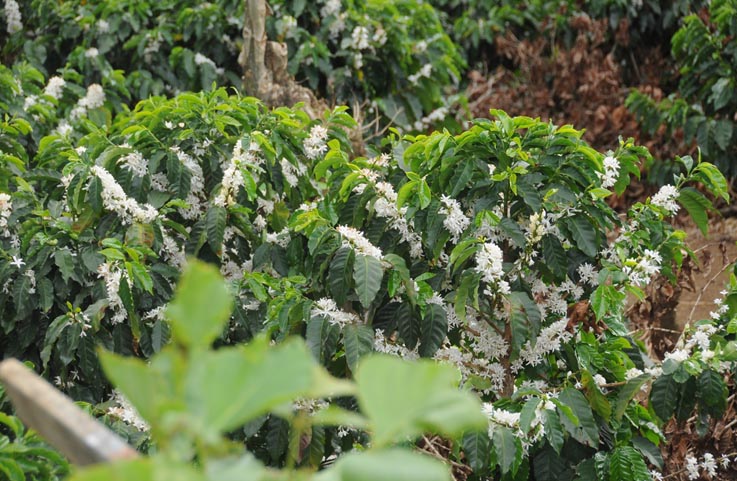
San Theo/Shenmu Manor Introduction
Santo Theo/Shenmu Estate is located in the southern mountains of Minas Gerais, at an altitude of about 1200 meters, with an average annual temperature of 19°C (66°F) and an average rainfall of 1600 mm per year. The excellent geographical location and excellent climate create a unique terroir where high-level fine coffee is also bred.
The farm itself has 300 hectares of tropical rainforest reserves, the most striking of which is also the symbol of San Theo/Shenmu Manor, which is more than 40 meters tall, Cariniana legalis. According to the owner's rough estimate, it has grown here for more than 1500 years.
According to José Renato Gonçalves Dias, owner of the San Teo/Shenmu farm, crops have been produced here since 1948 and continue to be produced today; the farm itself uses only organic fertilizers to provide plant nutrients to maintain the vitality of the land itself. The estate has about 160 permanent employees, provides a good and sustainable living environment, includes a comprehensive health and medical program, trains workers in their professional development, and has a school for their children to have a good school environment. The coffee at San Teo/Shenmu Estate is completely different from the average large Brazilian estate. No machines are used instead of manpower. From the harvesting of coffee berries to the post-processing, it is all done by hand. Harvesting workers at the park harvest only fully ripe coffee cherries, which are sent to pulpers for pulp removal or placed directly in the courtyard for sun exposure. After the post-processing method is completed, the coffee beans are packed into sacks until the average moisture content drops to 11%, and then transferred to wooden warehouses for 30 days before export. Finally, each batch of coffee will undergo precision screening by density and electronic color sorters to complete the entire production process. In addition, Santo Theo/Shenmu Manor has passed ISO 9001/2002 Quality Management System certification, which means that Shihara itself can precisely control the production quality and output of coffee beans. Each production batch has its own file and complete historical records, providing the owner to trace the production process to control the quality. Shohara has also been certified by UTZ Certified Systems and joined the Brazil Specialty Coffee Association.
José Reinado Gonsalves Diaz owns two manors. In addition to this excellent Santo Theo/Shenmu Manor, there is another very famous sister manor, namely the world-famous Brazilian COE Champion Manor Queen Manor. Over the years, the two manors have won numerous awards in the COE Excellence Cup and are popular all over the world.
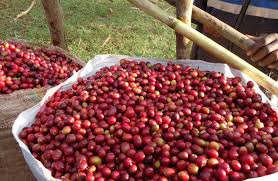
Brazil South Minas San Teo/Shenmu Manor 100% Yellow Bourbon Sun-baked Coffee Flavor Description
Brazil Fazenda Sertaozinho Yellow Bourbon Natural
Location: Botelhos, Sul de Minas Gerais
Villa Garden: Fazenda Sertaozinho
altitude: 1200 m
Type: Yellow Bourbon
Treatment: sun exposure
Awards: 2017 COE Cup of Excellence 3rd runner-up
Flavor Description: Bread cubes, spices, slight fruit vinegar aroma, rice paste, longan honey aroma at the end, bitter Chinese medicine, 70% chocolate.
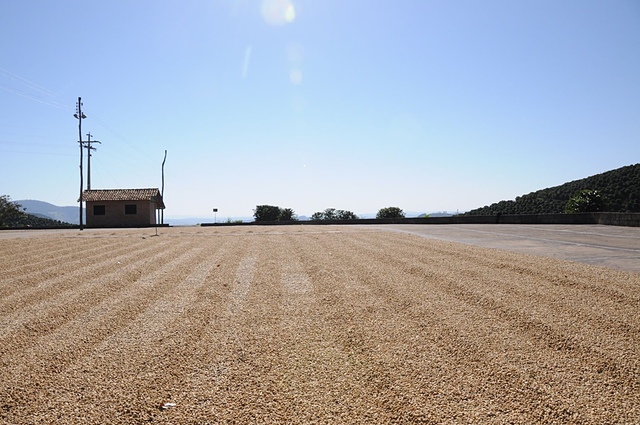
Name: Brazil Ipanema Manor Sweet Sun
(Brazil Ipanema Dulce Natural)
Origin: Sul de Minas region
Manor: Fazenda Ipanema
Breed: Arabica
Altitude: Average 800 to 1,370 m
Treatment: Solarization
Annual temperature: 23°C
Annual rainfall: 2000mm
Harvest: N/A
Flavor Features: Sweet Sunburn is a classic bestseller at Epanema Manor,
The thick taste and chocolate flavor are the reasons why sweet sun is popular among users
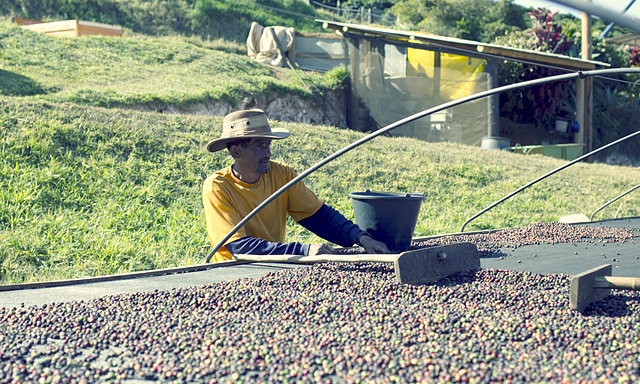
Introduction:
Since the introduction of coffee trees from Guyane française in 1720, coffee production has gradually become
A science. Before 1990, the Brazilian government strictly monitored the coffee industry.
There are price protection measures, and the state has always implemented minimum price protection measures for farmers.
This leads to overproduction of coffee. During the period before World War II, surplus stocks amounted to 78 million bags,
They had to be burned or thrown into water to be destroyed. Free markets have been open since 1990,
The original "Brazilian Coffee Authority"(IBC) was replaced by the state's non-investment administrative agency-
The National Economic Association, which pursued a policy of non-intervention, allowed producers and exporters to work directly with each other.
Negotiate. The activities of exporters are monitored by government legislation and legal exporters are registered by the relevant authorities.
Brazilian coffee, Brazilian coffee comes in many varieties, and just like other Arabica coffees, most
Brazilian coffee is not washed but dried, and they are classified according to the state of origin and port of shipment.
Brazil has 21 states, 17 of which produce coffee, but five of them produce the most.
98% of Brazil's total production, which is Parana, Sao Paulo,
Minas Gerais, Espirito Santo and
Bahia Region. Parana, in the south, produces the most impressive, accounting for 50% of the total.
Brazilian coffee is characterized by low acidity, rich oil, rich alcohol, suitable for medium roasting
And Italian roast formula coffee beans.

This coffee comes from a single estate product, Fazenda Ipanema.
A blend of three different coffee treatments-washed, sunburned and
Peeling, sun exposure and different varieties of formula. Fazenda Ipanema was founded in 1969 and
The Bozano, Simonsen and Gafisa groups form an apartment complex.
(the Condomínio Aliança) Purchase of the first farm 230 hectares in Minas Gerais
The southern city of Alfenas (Minas Gerais), named São Joaquim, was renamed in 1970
IPANEMA AGROINDÚSTRIA S.A.,The Campo Verde, Conquista,
Vitória and Capoeirinha 4 estates with a total area of 7000 hectares started growing coffee and oranges
Fruit trees, the first stage of planting 3000 hectares of oranges and 3000 hectares of coffee was completed in 1986. Purchased again in 2002
More than 100 years old coffee estate Fazenda Rio Verde, with an area of 1750 hectares, today
With 5,500 hectares of coffee plantations, Ipanema is Brazil's largest estate with 12 million trees.
Coffee tree, annual production of 7000 metric tons of green beans, main business in trade and production, global coffee market company
Ranked as the eighth largest coffee company in the world, it sells coffee in 27 countries.
This batch of coffee Fazenda Ipanema sweet sun harvest from Ipanema three
Different farms, the fruit harvested directly exposed to the sun, together with the flesh with the skin sun
Preserve more flavor and sweetness of raw beans. Currently Ipanema has 5,500 hectares of arable land
Scattered among three historic coffee estates Conquistar, Capoeirinha, Rio Verde
All three estates are located in Brazil's most prestigious Sul de Minas region.
Ipanema is collaborating with senior Brazilian agricultural experts to address soil, climate,
Altitude and geological characteristics were analyzed, and over 40 years of planting experience produced today's
High quality coffee. In addition to coffee cultivation, sustainable
But also Ipanema's commitment to consumers, through collaboration with agronomic scientists,
Seek better coffee and ecological operation model, including 1,200 hectares for ecological sustainable development
As a result of these efforts, Ipanema received UTZ certification in 2002 and Rainforest Conservation in 2004.
Alliance certification. Ipanema Manor's quality control has its own coffee cup testing team
All members hold the American Fine Coffee Association Cup Tester license and CQI Quality Association certificate.
More than 10,000 quality inspections are performed on average a year, with 300 cup tests per day.
With these strict quality controls, Ipanema's coffee is always maintained in a high quality state.
Flavor Features: Sweet Sunburn is a classic bestseller at Epanema Manor,
The thick texture and chocolate flavor are the reasons why sweet sunburn is popular among users.
Hand rushed to Brazil's Shenmu manor. 15g powder, medium fineness grinding (sugar size), v60 filter cup, water temperature of 90 ℃, first injection of 30g water, stewing for 30 seconds, injection to 105g water cut off water, wait for the powder bed water to drop to half, then inject water slowly and evenly until 225g water, finally shake the filter cup to increase extraction, water powder ratio 1:15, extraction time 2:04
Important Notice :
前街咖啡 FrontStreet Coffee has moved to new addredd:
FrontStreet Coffee Address: 315,Donghua East Road,GuangZhou
Tel:020 38364473
- Prev
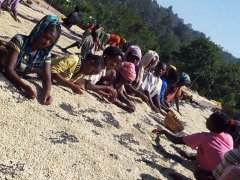
How much is Ye Jia Xuefei coffee? Erika Kebel Aricha, the most famous producing area of Ye Jia Xuefei.
For the exchange of professional baristas, please follow the coffee workshop (Wechat official account cafe_style) introduction: Kebel Aricha is located in the Gedeo region of southern Ethiopia, where the jurisdiction is better known by Yega Sheffield and Kochere. The treatment plant is located four kilometers west of the city of Yegashafi and there is a small place name Guji. This
- Next
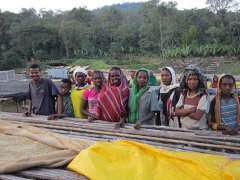
The first choice of hand-brewed coffee with boutique coffee beans in Yejashafi Manor-washing Yega Xuefei.
For professional barista communication, please follow the coffee workshop (Wechat official account cafe_style) when Balzac says I'm not at home, in the coffee shop; not in the coffee shop, on my way to the coffee shop. Qianjie Coffee also said that drinking a cup of coffee with the right taste is like finding a bosom friend; making a cup of coffee with the right taste with your own hands is like finding yourself. The coffee tree is just a plant, coffee beans.
Related
- Detailed explanation of Jadeite planting Land in Panamanian Jadeite Manor introduction to the grading system of Jadeite competitive bidding, Red bid, Green bid and Rose Summer
- Story of Coffee planting in Brenka region of Costa Rica Stonehenge Manor anaerobic heavy honey treatment of flavor mouth
- What's on the barrel of Blue Mountain Coffee beans?
- Can American coffee also pull flowers? How to use hot American style to pull out a good-looking pattern?
- Can you make a cold extract with coffee beans? What is the right proportion for cold-extracted coffee formula?
- Indonesian PWN Gold Mandrine Coffee Origin Features Flavor How to Chong? Mandolin coffee is American.
- A brief introduction to the flavor characteristics of Brazilian yellow bourbon coffee beans
- What is the effect of different water quality on the flavor of cold-extracted coffee? What kind of water is best for brewing coffee?
- Why do you think of Rose Summer whenever you mention Panamanian coffee?
- Introduction to the characteristics of authentic blue mountain coffee bean producing areas? What is the CIB Coffee Authority in Jamaica?

